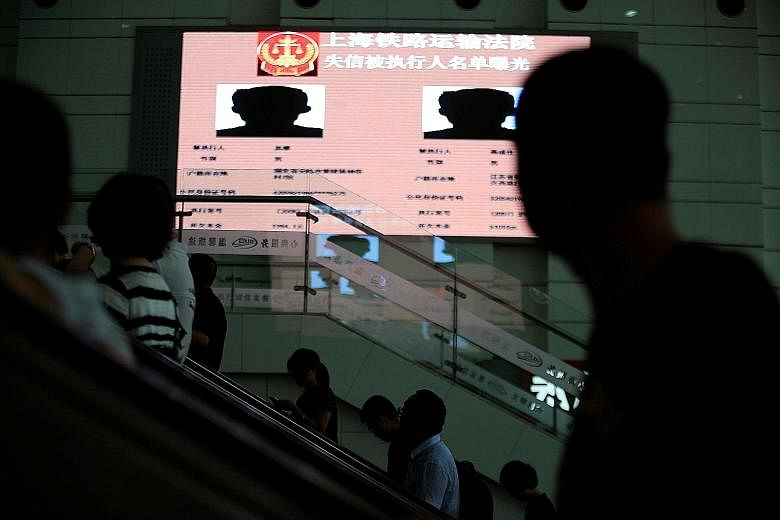SHANGHAI • Above throngs of commuters at a Shanghai railway station, four billboards were lit up with the name of the head of a mid-sized industrial product maker.
But he was not promoting his company or its goods.
The Shanghai Railway Transportation Court put his name in lights earlier this month because his firm had failed to pay a 2.9 million yuan (S$585,000) debt.
A separate court in the eastern Zhejiang province issued a freezing order over his company's assets two years ago for money owed to China Construction Bank.
As growth slows, struggling borrowers are finding it harder to repay their loans, pushing China banks' official soured debt above US$299 billion (S$404 billion) at end-May, though analysts estimate the true level is much higher.
To fight this rising tide, Chinese courts have ramped up their use of shaming tactics, underlining the failure of other methods of making debtors pay.
Mr Zhou Qiang, president of China's Supreme People's Court, in March declared debt avoidance was a major problem, and said the court would give those who tried to avoid judgments against them "nowhere to hide".
It would do that by collecting information on absconding debtors, holding press conferences to gain publicity and restricting access to credit, among other methods, he said.
For 10 days up to last Friday, the names, ID numbers, addresses, case numbers and amounts owed by 20 people - individuals and company heads - were flashed across screens at the two main Shanghai railway stations at 10-minute intervals. There were also some photos.
The debtors displayed on the board sometimes owe modest amounts, with one shamed for failing to pay just 1,984.1 yuan.
"It is an important initiative to deter dishonest debtors," said the Shanghai Railway Transport Court.
Some of the people featured have changed their phone numbers, addresses and disappeared, it said, adding that the public can call in with clues to help the authorities track down the runaway debtors.
Normal methods of enforcement in China include freezing and selling of assets. They are not working.
"There are too many cases, too few judges," said Mr Wu Zhendong, a financial services lawyer from King & Wood Mallesons, explaining why enforcing debt judgments are so tough.
A decree issued by the State Administration for Industry and Commerce at the end of last year set out the circumstances under which a company can be publicly shamed.
The decree expands upon 2013 Supreme Court rules saying dishonest debtors' details can be published in newspapers, on the radio, television and the Internet.
While courts outside China's financial hub have adopted this tactic before, the judiciary in Shanghai has only this year taken to shaming with gusto. It does not always work.
In May, Shanghai Putuo People's Court plastered the details of 76 debtors on electric billboards outside five popular malls. But it received no public response. There was no reward offered for information on a missing debtor.
REUTERS

